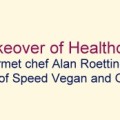by Randy Graham
Next time you prepare a meal for yourself or your family, pay attention to how many processed or pre-packaged food items you use. Grab the macaroni and cheese box off your shelf or the frozen waffles from the freezer and read the ingredients. It’s likely you’ll find food additives in each one.
This can’t be healthy in the long run. Our bodies were made to eat fresh, local food. If you think about it, mankind has existed for many thousands of years but it has been just the last hundred years or so that processed foods have appeared in kitchens across the country.
So what’s wrong with processed foods? An article I found on-line says it better than I could:
“Unfortunately, most processed foods are laden with sweeteners, salts, artificial flavors, factory-created fats, colorings, chemicals that alter texture, and preservatives. But the trouble is not just what’s been added, but what’s been taken away. Processed foods are often stripped of nutrients designed by nature to protect your heart, such as soluble fiber, antioxidants, and ‘good fats’. Combine that with additives, and you have a recipe for disaster.”
The article goes on to identify the four most harmful ingredients in packaged foods. They are salt, high-fructose corn syrup, refined grains and trans fats. Salt is a good thing if used in moderation. It is necessary to maintain your body’s fluid balance but if you take in more salt than your body needs, it can raise the blood volume forcing your heart to work harder and making your veins and arteries constrict. We’re talking high blood pressure here. Salt is predominant in processed foods such as canned soup, condiments such as soy sauce and fast food such as French fries.
High-fructose corn syrup is used by the food industry because it is less costly, sweeter to the taste and mixes more easily with other ingredients. Research suggests that high-fructose corn syrup encourages overeating and may deplete your body’s chromium reserves, a mineral important for healthy levels of cholesterol, insulin and blood sugar. In addition, genetically modified corn is commonly used in the production of corn syrup, corn sweetener, corn syrup solids, ad infinitum.
Refined grain foods include white bread, rolls, sugary low-fiber cereal, white rice and white pasta to name a few. At least seven major studies show that those of us who eat more whole grains (including dark bread, oats, brown rice, bran, and grains such as amaranth and quinoa) have 20 to 30 percent less heart disease. In contrast, those who opt for refined grains have more heart attacks, are more resistant to insulin and are prone to high blood pressure.
Trans fats raise LDL cholesterol (bad cholesterol) and lower HDL cholesterol (good cholesterol). They are now thought to be twice as dangerous for your heart as saturated fats, and according to one study cause up to 100,000 premature heart disease deaths each year. Instead of using margarine to sauté fresh vegetables, or oleomargarine as it was first known, substitute extra virgin olive oil.
Bottom line? When you buy and cook fresh foods, you avoid an excess of salt, high-fructose corn syrup, refined grains and trans fats. If you are prone to stocking the larder with canned or packaged foods, it is difficult to cook fresh. The trick is to always think fresh whether you consume prepared foods or not.
Thinking fresh gets you in the proper frame of mind for making the transition from mostly prepared foods at your table to mostly fresh, flavorful and additive free foods. Before you know it you’ll be reaching for a can of corn at your local grocery and you’ll pull your hand back thinking “I should look for fresh corn in the produce department and take that home to my family”.
Another trick is to regularly buy local, fresh produce from your favorite booth at your farmers’ market. There are very few processed foods there. Fresh sprouts, for example, are not processed with salt and sealed in cans with an average shelf life of months (if not years). Bell peppers are not cut into strips, packaged, frozen and marketed as a “quick fix for sausage and peppers”. There are green, leafy stalks growing out the top of the carrots at the farmers’ market and the carrots haven’t been peeled or processed with chlorinated water to retard bacterial growth.
If you “go fresh”, your taste buds will thank you. Your body will thank you. Your family will be grateful because it is the healthy thing to do.






1 Comment
Chia (324 comments)
February 27, 2010 at 9:10 pmHey rgraham33, thanks for another excellent and important article. You understand good nutrition and the importance of keeping food REAL (real food vs. fake food). I’ve enjoyed reading all your blog posts.
I must confess that as much as I am a proponent of fresh & wholesome food, I also enjoy packaged snacks food like cookies, chips, chocolate bars, etc. However, I buy the “better junk food” brands, like ones sold in the natural food stores, co-op markets, Trader Joe’s, and Whole Foods Market.
But my primary food each day consist of whole fresh fruits and vegetables (avocados, whole grain rice, broccoli, apples, etc.), so that makes me feel okay about also eating the snacks.